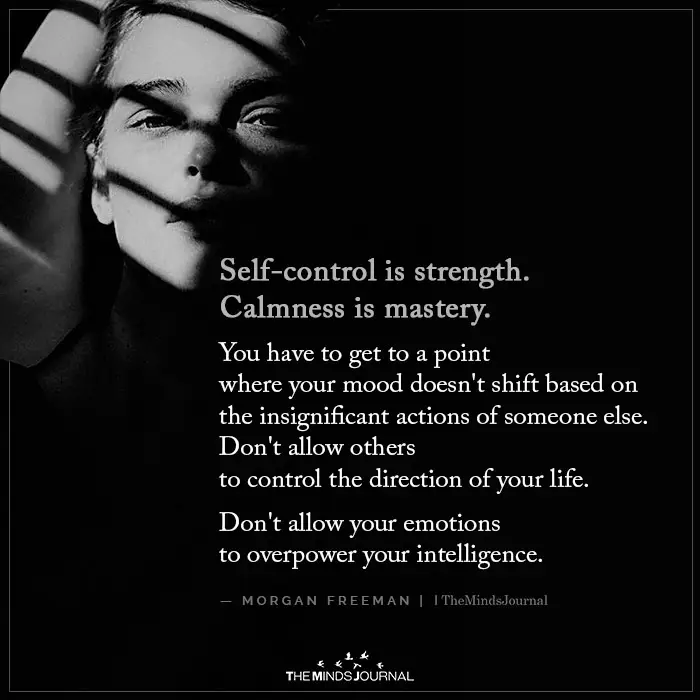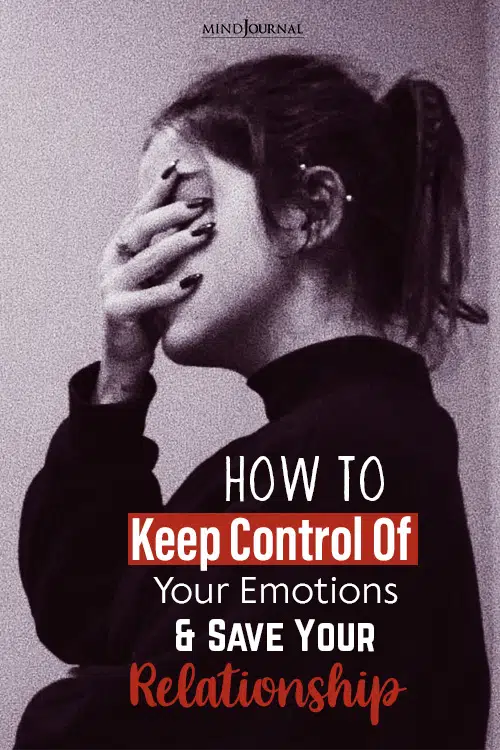“If your emotional abilities aren’t in hand if you don’t have self-awareness if you are not able to manage your distressing emotions if you can’t have empathy and have effective relationships, then no matter how smart you are, you are not going to get very far.” – Daniel Goleman
Learning how to keep control of your emotions is one of the best ways that you can keep your relationship a healthy one.
Something I hear from clients regularly is that, when they are in conflict with their partner, instead of being able to talk about things, emotions take over, people get hurt and nothing gets resolved. As a result, issues are pushed down, only to resurface over and over. This continued pain will ultimately destroy any relationship, no matter how much love is involved.
To that end, I would like to share with you why knowing how to keep control of your emotions is a key part of keeping your relationship healthy.
1. Step Away But Don’t Storm Off.

We are taught on TV and in movies that, to make our point, we need to make a declaration and then walk away. In the movies, after that declaration, the character has an epiphany that they were wrong and their person was right and everyone lives happily ever after.
OR, in the movies, when we storm away, our partner chases us because they love us so much and want to make things right.
But, in reality, storming away gets no one anywhere. It cuts any conversation short and only serves to put off until later any opportunity to resolve the issue.
All of that being said, it’s very important to step away if you find your emotions are getting the best of you.
I would encourage you to, if you are finding your emotions getting out of control, tell your person that you need five minutes and to step away and take some deep breaths. To go for a walk or sit with your puppy or take a shower.
So, step away but don’t storm away. This will give you both a chance to calm down a little bit so that maybe you can return to the conversation in a calmer, more productive way, to put the issue to bed and move on.
Related: 8 Steps To Regulate Your Emotions When They Drive You Crazy
2. Take Deep Breaths.
I know it sounds very trite, but breathing is one of the best ways to keep control of your emotions.
Think about the last time you got into a fight with your partner. Did you find you were having a hard time expressing yourself? Did you get overwhelmed with tears, perhaps becoming so upset that you were hyperventilating? Did you find your heart racing more than usual?
All of those things can be the result of a lack of oxygen to the brain. Without sufficient oxygen, it’s hard to think. Without sufficient oxygen, our nervous system gets activated and emotional regulation can be very difficult. Without sufficient oxygen, our body can go into fight or flight mode, which will only make things worse.
When you find yourself in conflict with your partner, I would encourage you to pause for a second and take a deep breath, breathing right down into your tummy. Taking a deep breath will help your brain get the oxygen it needs so that you can think clearly and, hopefully, keep control of your emotions.
3. Keep Tuned In To How You Are Feeling.
I know for me, when I used to get escalated in my marriage, I was not aware of it. The adrenaline caused by the conflict took over and propelled me forward towards chaos. By the time that happened, there was no going back.
What I’ve been working on recently is recognizing my emotions as they evolve, recognizing when they are getting out of control.
When I do recognize that they might be getting out of control, I do #1 and #2 above. I either ask for a time out or I take a deep breath, pause and try to get my emotions back in check, and then proceed.
I know this is easier said than done. It can take a lot of work to try to regulate your emotions. But being aware of them is a very important step to doing so.
4. Don’t Focus On One Word Or Sentence.
When you are in an argument, do you find that you tend to focus on one ugly word or one disrespectful sentence that has been said?
Do you find that, if your partner makes an offhand comment that you find unkind or condescending, you cannot let it go? Does the fight then pivot to that one thing instead of what originally caused it? And does that just derail the whole thing?
One key part of keeping control of your emotions during conflict is to not focus on the small things. Yes, we all say things in the heat of the moment, things that we regret but once they are said there is no unsaying them. If you can keep in mind that we are all only human and we say things that we don’t mean, this might help you let them go.
5. Don’t Pick A Fight.
For many of us, we spend our days in our heads. If something has happened that is upsetting us, we might dwell on it and get ourselves all worked up. Once we are worked up, we have two choices – to bring it up calmly with our partner or to pick a fight. Most of us pick a fight.
If we pick a fight instead of approaching something from a calm place, the fight is derailed even before it begins. Our emotions are already elevated and our partner is immediately on the defensive. The fight will escalate and have no chance of being resolved – which can only make everything worse.
I encourage you to, if you are struggling with something, tell your person that you need to talk about it. Don’t be passive-aggressive or snide. Just be a grown-up and talk.
Related: How Do You Communicate In A Relationship Without Fighting About The Same Old Things?
Learning How To Keep Control Of Your Emotions Is Not An Easy Thing To Do.
We are very emotional creatures, particularly women, and when we care deeply about something, it’s hard for us to not feel our feelings.
But, if you can learn how to not pick a fight, how to step away and take a deep breath in the middle of a conflict, to stay focused on how you’re feeling, and to not vilify that ONE thing that was said, you will definitely be a long way towards controlling your emotions.
And, I think you will find that, if you can keep control of your emotions during a conflict with your partner, your relationship will be healthier and, if it has been struggling, it might be saved.
You can do this! I know you can!
Written By: Mitzi Bockmann Originally Appeared On: Let Your Dreams Begin









Leave a Reply
You must be logged in to post a comment.